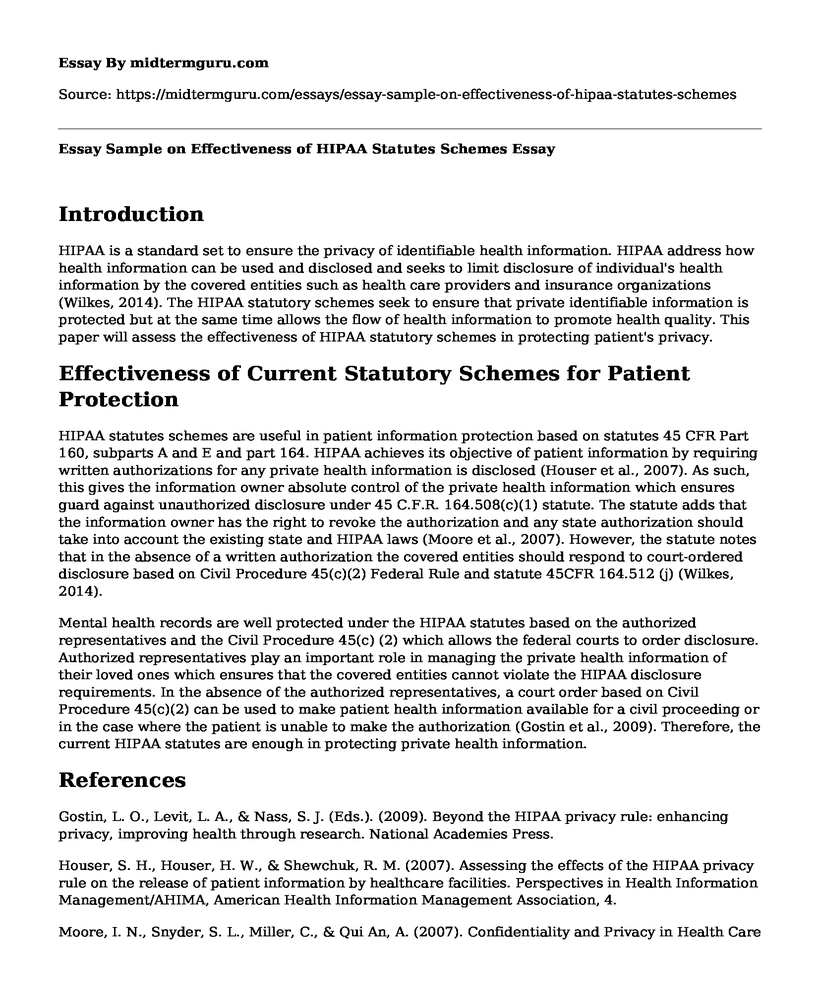Introduction
HIPAA is a standard set to ensure the privacy of identifiable health information. HIPAA address how health information can be used and disclosed and seeks to limit disclosure of individual's health information by the covered entities such as health care providers and insurance organizations (Wilkes, 2014). The HIPAA statutory schemes seek to ensure that private identifiable information is protected but at the same time allows the flow of health information to promote health quality. This paper will assess the effectiveness of HIPAA statutory schemes in protecting patient's privacy.
Effectiveness of Current Statutory Schemes for Patient Protection
HIPAA statutes schemes are useful in patient information protection based on statutes 45 CFR Part 160, subparts A and E and part 164. HIPAA achieves its objective of patient information by requiring written authorizations for any private health information is disclosed (Houser et al., 2007). As such, this gives the information owner absolute control of the private health information which ensures guard against unauthorized disclosure under 45 C.F.R. 164.508(c)(1) statute. The statute adds that the information owner has the right to revoke the authorization and any state authorization should take into account the existing state and HIPAA laws (Moore et al., 2007). However, the statute notes that in the absence of a written authorization the covered entities should respond to court-ordered disclosure based on Civil Procedure 45(c)(2) Federal Rule and statute 45CFR 164.512 (j) (Wilkes, 2014).
Mental health records are well protected under the HIPAA statutes based on the authorized representatives and the Civil Procedure 45(c) (2) which allows the federal courts to order disclosure. Authorized representatives play an important role in managing the private health information of their loved ones which ensures that the covered entities cannot violate the HIPAA disclosure requirements. In the absence of the authorized representatives, a court order based on Civil Procedure 45(c)(2) can be used to make patient health information available for a civil proceeding or in the case where the patient is unable to make the authorization (Gostin et al., 2009). Therefore, the current HIPAA statutes are enough in protecting private health information.
References
Gostin, L. O., Levit, L. A., & Nass, S. J. (Eds.). (2009). Beyond the HIPAA privacy rule: enhancing privacy, improving health through research. National Academies Press.
Houser, S. H., Houser, H. W., & Shewchuk, R. M. (2007). Assessing the effects of the HIPAA privacy rule on the release of patient information by healthcare facilities. Perspectives in Health Information Management/AHIMA, American Health Information Management Association, 4.
Moore, I. N., Snyder, S. L., Miller, C., & Qui An, A. (2007). Confidentiality and Privacy in Health Care from the Patient's Perspective: Does HIPPA Help. Health Matrix, 17, 215.
Wilkes, J. J. (2014). The creation of HIPAA culture: Prioritizing privacy paranoia over patient care. BYU L. Rev., 1213.
Cite this page
Essay Sample on Effectiveness of HIPAA Statutes Schemes. (2022, Sep 06). Retrieved from https://midtermguru.com/essays/essay-sample-on-effectiveness-of-hipaa-statutes-schemes
If you are the original author of this essay and no longer wish to have it published on the midtermguru.com website, please click below to request its removal:
- Paper Example on ER Nurses Organization
- Essay Sample on Diabetes Mellitus
- Social Work Administration - Essay Sample
- Understanding Autism Spectrum Disorder (ASD): Challenges & Contributing Factors - Research Paper
- Buchanan Unites Conservatives on Moral Issues in Bush Speech - Essay Sample
- Bob Selling Unapproved Drugs to US Consumers: Potential Harms - Essay Sample
- 2 Best Practices to Prevent Breast Cancer in Men & Women - Research Paper







